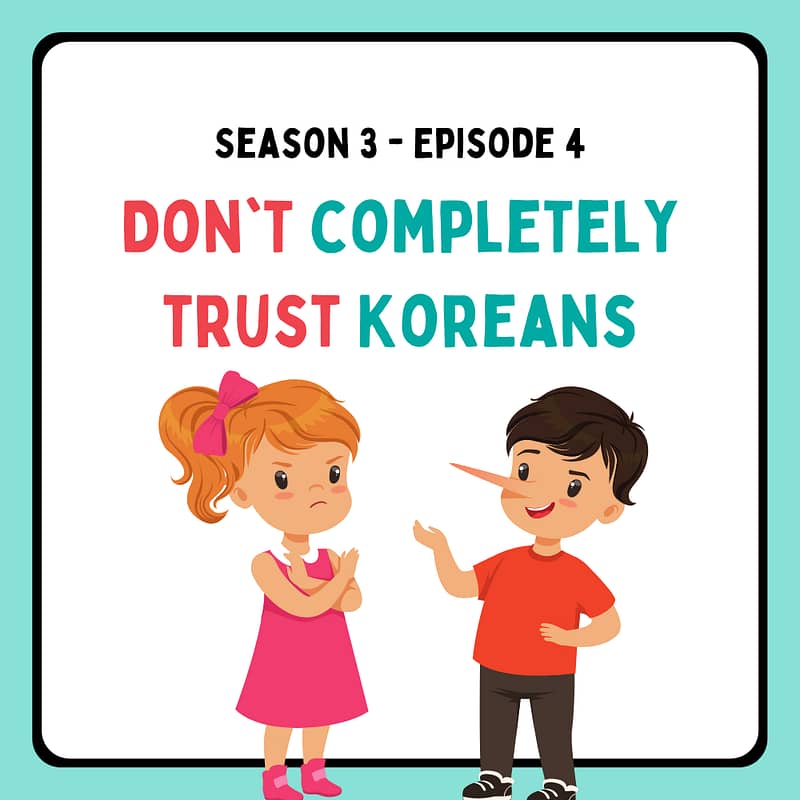Powered by RedCircle
S3 EP4. 한국인을 완전히 믿지 마세요.
S3 EP4. Don’t completely trust Koreans
안녕하세요? 잘 지냈어요? It’s your host of Korean study café, Vanessa.
Today, I will talk about the common lies Koreans habitually make in everyday conversation. Well, actually, those are not lies but expressions. But some people from other cultures can mistakenly interpret the actual meaning of these expressions. Then, let’s find out what they are in this episode.
First of all,
나중에 밥 한 번 같이 먹자 / 나중에 밥 한 번 같이 먹어요 Let’s eat once together later
조만간 또 연락할게 / 조만간 또 연락할게요 I’m going to contact you shortly again.
These two statements sound like the speaker wants to make another appointment any soon, but in reality, these are the typical farewell expressions when the conversation is about to end. Thus, if you try to make another appointment right away without understanding the inner meaning well, most Koreans would be flustered or very surprised and hesitant to react.
Here the words 나중에 later, 조만간 shortly doesn’t mean anytime soon. The speakers usually mean that someday in the future. Rather than interpreting the superficial meaning, try to think it is an expression to say, “I want to continue maintaining our good relationship by keeping in touch on a regular basis.” So if any Koreans say this expression to you, then you can reply 응, 그러자 / 네, 그래요 Yes, let’s do it, or 응, 그래 / 네, 그래요. Yes, all right. You don’t have to waste your time scheduling another gathering or waiting for them to contact you with a new meeting.
How do you guys greet each other in a similar situation in your country? Is it somewhat similar to Korean culture? Or Is it different? Usually, simple/basic expressions are developed through society’s way of life and the characteristic of people. So keep this in mind, and try to react like Korean.
All right, the second one is
천천히 와, or 천천히 오세요
It literally means “Come slowly.” In contrast, it is usually translated into English like “Take your time” When you think you’re going to be late to an appointment with your friend, you might send a text saying, “I’m going to be late a bit,” right? Then most generous friends would answer like “Take your time 천천히 와 / 천천히 오세요.” But as you probably already know, Korean people have the so-called 빨리 빨리 culture, which means fast, fast or quickly, quickly. It means that Korean people love everything to be processed quickly. In other words, they don’t like wasting their time unnecessarily. So when Koreans say this expression 천천히 와 or 천천히 오세요 take your time, it does not always mean that.
I mean, Koreans say it out of courtesy, but it’s possible that they mean like take your time but arrive on time, yet safely. Yes, most Koreans don’t like to waste their time so badly. Of course, if you are 5 or 10 minutes late, it should be no problem. Most of them have such tolerance, but if you are late a lot more than that, but even though your Korean friend says 천천히 와, 천천히 오세요, don’t feel so easy because they don’t mean it.
Like other cultures, some people are always late to everything in Korea as well, but most Koreans aren’t. So just keep that in your mind.
All right, the last one. That is
생각해볼게 / 생각해볼게요 Let me think about it; I will give it a thought.
When you suggest something to Koreans, if you hear this expression 생각해볼게, then it’s most likely to mean “No thank you.” Most Koreans are taught that it’s better to be polite in any circumstance, so in many cases, they try to avoid the chance that they have to say “No” to others. Hence, there are many alternative ways to say “No” that have understood agreement among Koreans. 생각해볼게 Let me think about it, I will give it a thought is the most typical one among those.
For example, if you go shopping and store employees offer something that you are not interested in buying, then you can say 생각해볼게요 to say no out of politeness. Also, when your friend suggests you go travel together to somewhere you are not really fond of, then you can also say 생각해볼게 to say that you don’t really like that idea.
Okay, this will be all for today.
Hopefully, this can be helpful for your learning. If you have any questions or opinions about this episode, contact us anytime. 🙂




